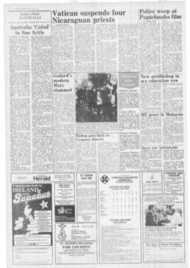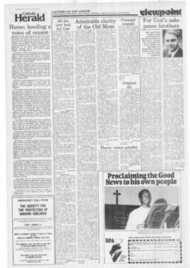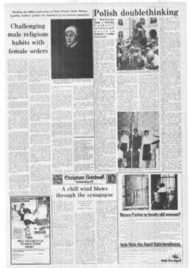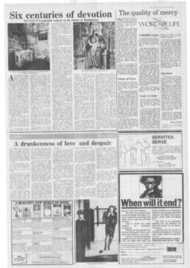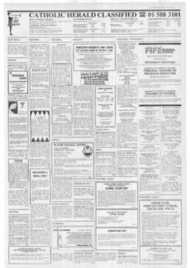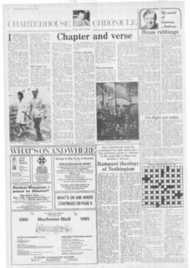Page 2, 1st February 1985
Page 2

Report an error
Noticed an error on this page?If you've noticed an error in this article please click here to report it.
Tags
Share
Related articles
Managua Priest Falls Foul Of Cardinal Obando
Jesuits Dismiss Rebel Priest
Nicaraguan Priest Snubbed By Rome By Timothy Elphick
Priests Suspended For 'marx Viewpoint
Rome Talks Seek Solution To Nicaraguan Priests Row
Vatican suspends four Nicaraguan priests
by Peter Stanford THE FOUR Nicaraguan priests who are members of the country's Sandinista Government have been suspended a divinis front their priestly functions by the Vatican. The announcement from the Vatican press office came earlier this week.
Having refused repeated instructions from Rome to give up their posts in the government, Fr Fernando Cardenal, the Minister for Education, his brother, the poet and culture minister Fr Ernesto Cardenal, Fr Miguel d'Escoto Brockman'', the Foreign Minister and Fr Edgar Parrales, the Nicaraguan Ambassador to the Organisation of American States are now forbidden to officiate at any of the sacraments, anywhere in the world.
However, the four have announced their determination to continue their work in government. Fr d'Escoto has, along with Fr Ernesto Cardenal, been given fifteen days to consider his decision before A spokesman at the Jesuit-run Catholic University in Managua told the Catholic Herald this week that the Nicaraguan clergy were solidly behind the four priests in their resolve to carry on their government work, and pledged that they would receive the respect due to a priest.
The President of the Nicaraguan bishops conference, Bishop Pablo Antonio Vega, had earlier said that the priests would be forbidden to use the personal title of Father. This clause aside, the decision seems to have come from Rome though, and not the bishops conference.
The history of the priests began in 1979 when the Sandinista revolution swept away the repressive dictatorship of Agostino Somoza. The four priests joined the government pressure from the conservative Forces in the bishops' conference. After many months of tension the bishops, in accordance with the new Code of Canon Law, gave the four special permission to continue in office, providing that they did not exercise their priestly functions either in private or in public.
Within a year of this agreement, however, in the words of Fr Fernando Cardenal in a letter "to my friends" written after his dismissal from the Jesuits in December of last year, "they (the bishops) did not pressure us personally but always used the mass media. In those last two years the Vatican also began to participate in the pressure but it also never did so personally or directly".
Fr Cardenal then wrote six times to the Nicaraguan bishops asking for a meeting to discuss his position, but was not once given a reply. "It hurts to feel permanently rejected by one's pastors" he wrote, In Easter of 1984 events came to a head with the expulsion of ten foreign priests from the country by the government after they had taken part in a rally led by Archbishop Obando y Bravo of Managua. Relations deteriorated further when the bishops called for dialogue between the Sandinistas and LIS-funded "Contra" guerrillas.
Fr Fernando Cardenal defended his office in his letter. "My conscience grasps, as if in a global intuition" he wrote, "that my commitment to the cause of the poor of Nicaragua comes from God, and that for me today to be faithful to the Gospel and to do God's will in my life is to continue with my present responsibilities."
Turning to the immediate situation, he noted that "Nicaragua more than ever needs qualified witnesses to the truth and justice of its causes."
Fr Cardenal had some harsh words for Pope John Paul in his letter. "The one. who has categorically refused to grant an exception to the priests in Nicaragua has been Pope John Paul tl", he wrote.
blog comments powered by Disqus



